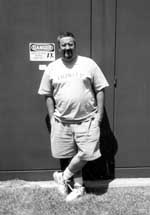Trabalenguas
I knew a red-haired girl
once who could tie a cherry
stem in her mouth.
Once she finished, the knot
perched on her lips, a broken
promise. She spoke Arabic,
been a diplomat. When she drank
she liked to lean back and roll
her "Rs" as in "erre con erre
cigarro, erre con erre barril,
rapido pasán los carros
por las lineas del ferrocarril."
Tongue twisters like barbed wire,
a finger in her mouth, then pop
a million ash-colored birds aflutter.
When she stared at me I could
feel her words rumbling
through, a distant thunder, blush
blue, even through the years she's
been gone, this woman of fire
words, queen of trabalenguas
Gossamer Cosmos
How many thermometers did I break open
on my mother's dining room table to watch
the mercury run between the cracks, globules
of magic that melded and fused into each other,
tips, this silver-flash radiance of a chemical
years later I heard poisoned men in Japan
through fish they ate. Everything kills us.
What doesn't do it fast, does it slowly, as if
a magician in front of you is tugging out lengths
of gossamer scarves, a rainbow of them
that keeps flowing, spilling as he pulls and yanks.
I remember those days in the early 1960s in Cuba,
burnt into my mind like some sepia filter, a boy
in funny-looking shorts, mother-sewn, scalloped
hair cut my father called malanguita. How many
things did I not break, or ruin in my grasp? Once
I stuck my head between the wrought iron bars
of the front gate, and Manuel, my father's
friend and neighbor, had to saw one off to free me.
rotating dial I thought was a train, its black
interspersed ticks freight of another life,
my life of imagination. I stood away afternoons
there by the back fence and spent hours watching
that dial whirl like the moon. Once, too, I whistled
and set the chickens aflutter. My grandmother
peeked her head out of her bedroom window—
she asked what I was doing. I told her I was riding
on a train into the Arabian desert, where camels
stampeded down sandy slopes to disappear in mist.
I was a child of seven then. As a man I believe
in magic, still, the way I will get up and walk out
into my garden to find gossamer spiders busied
themselves through the night, built these webs
between leaves of grass. Tiny tents they have left
on the trail for me to find, links back to my origins.
Recitative of Jackson Pollock's Love Affair with Gravity
When the paint brush becomes a lasso,
paint forms vectors stampeding across
a canvas strewn on a hard floor, rock-
solid surfaces beckoned to him, drips
these lightning bolts of color, splashed
and spawned in layers, spirochetes,
paramecium specks in a vortex of time
and sensibility. Some say he was possessed
by demons, and surely, these baptisms
in paint and stroke made a saint of him—
Who submerges, comes clean. Who loses
concentration, plummets deeper in hell.
The cigarette dangling in the corner of his
mouth would sometime burn near his lips,
a reminder of how much time he'd swallowed.
The canvas at his feet writhed, wrinkled,
stretched into infinity—a whirlwind of paint
splashed and dripped reds, blues, blacks—
these colors of possession, a demon cut free.
La Frontera y La Distancia/The Border and the Distance
Aqui donde where if you split a rock,
a black bird will emerge, its wings iridescent indigo,
moist from the hatching, a train track crosses the land,
a serpent which divides the earth into two: on that side,
a golf course designed by some famous, not-yet-dead
gringo golfer, and on this one a shanty town of card
board and tin houses sloped like bad teeth
on the valley-mouth of this region.
The children play in the river, they swim
like fish, their skin growing razor-sharp scales. Over
time they have learned to stay under when the border
patrol comes through. When the coast is clear,
they emerge and cross the tracks, leaving a trail of wet
tracks. They have learned to follow those blackened
birds they raise from the rocks. In this heat, the children
harvest the rocks by pricking a finger with a cactus needle
and letting the smooth stones drink their blood-water.
At night the rocks glow like lava. This is the sign
of living rocks. Some say they hear the children singing
like those birds in the distance. The ones that have learned
to cross all borders.

